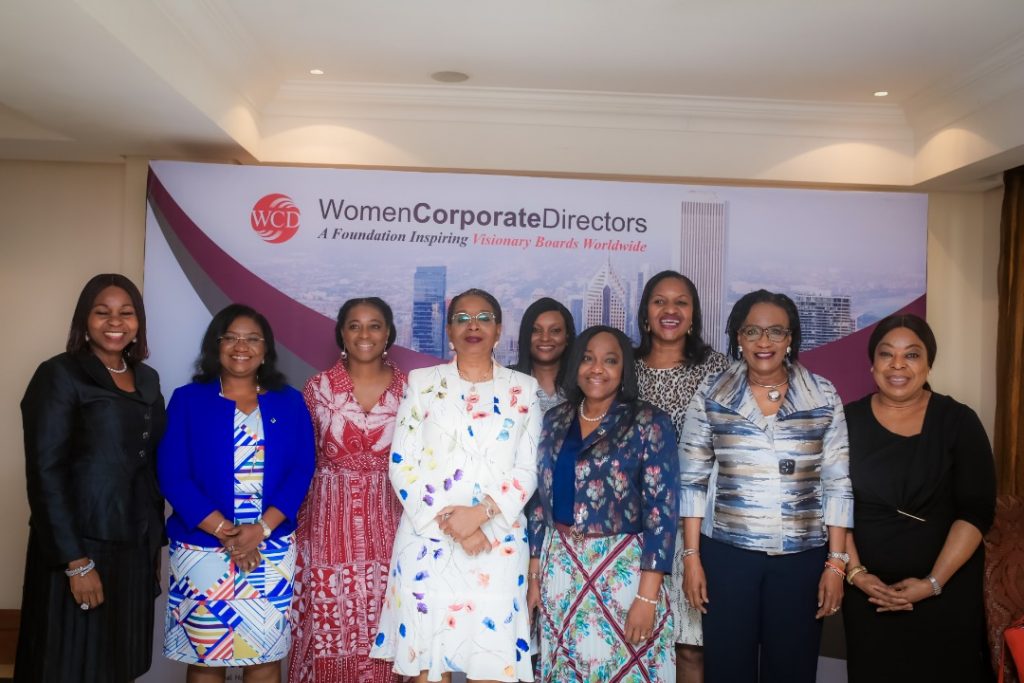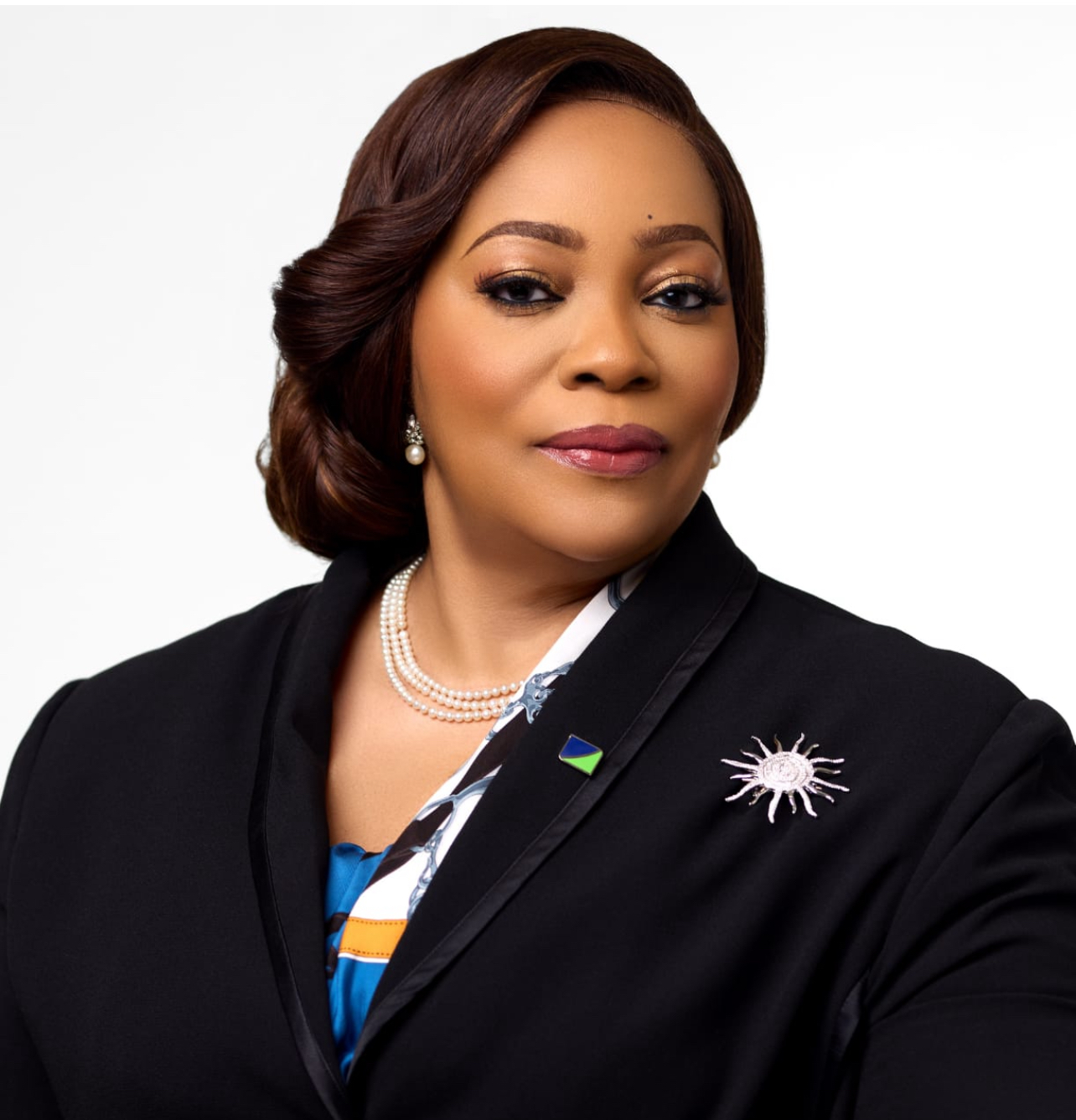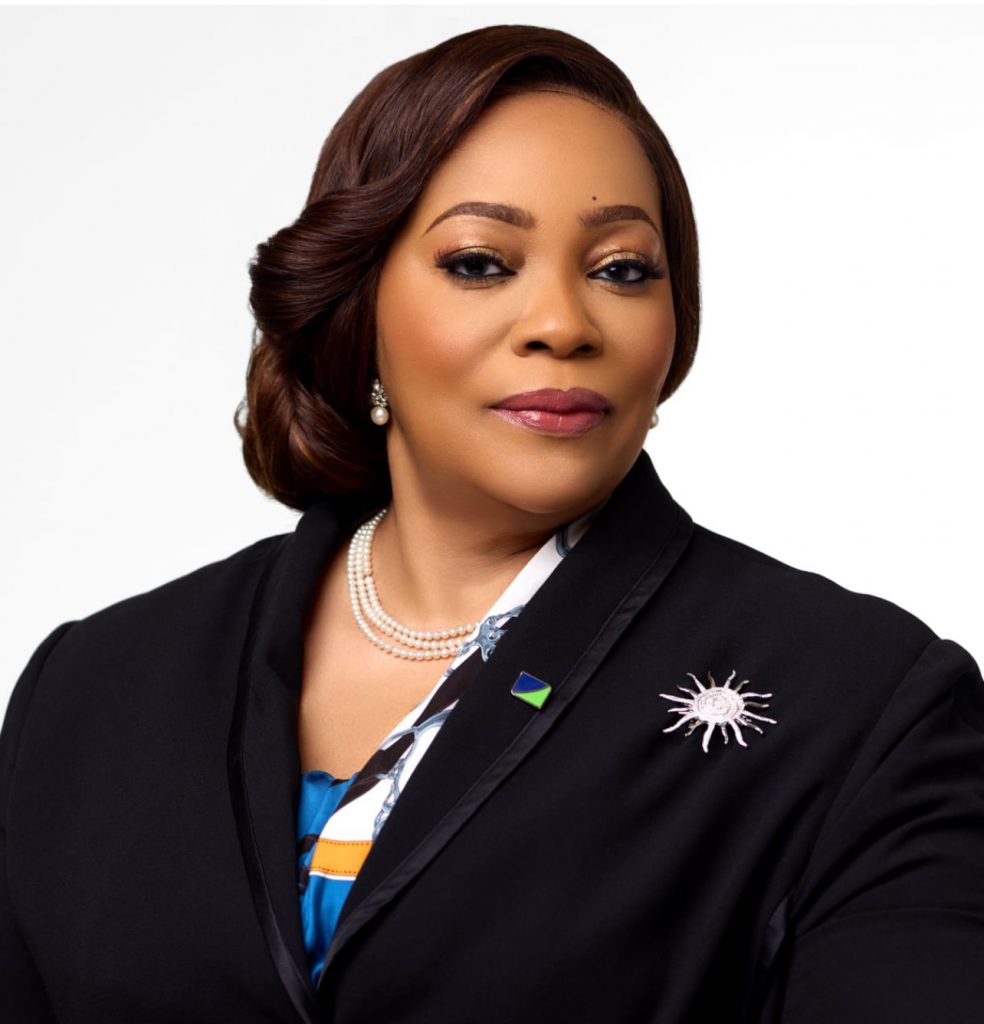brand
FBNHOLDINGS: SETTING THE TONE FOR GENDER INCLUSIVENESS, BALANCE IN BOARDROOM


Bashirat Odunewu, Group Executive, Energy and Infrastructure, FirstBank; Cecilia Akintomide (OON), Independent Non-Executive Director, FBNHoldings; Folake Ani-Mumuney, Chairman, FBNInsurance Brokers/Group Head, Marketing & Corporate Communications, FirstBank; Ibukun Awosika, Chairman, First Bank of Nigeria Limited; Fiona Ahimie, Managing Director, FBNQuest Securities Ltd; Oluwande Muoyo, Independent Non-Executive Director, FBNHoldings; Ijeoma Nwogwugwu, Managing Director, ARISE News Channel Africa; Otunba Debola Osibogun, Non-Executive Director, FBNHoldings and Oyinkan Adewale, Independent Non-executive Director, FBNQuest Merchant Bank in a group picture at the Women Corporate Directors (WCD) Foundation, Nigeria Chapter, meeting hosted by FirstBank, to promote female leadership in management.

In many parts of the world, including Nigeria, women often face the barriers of discrimination and persistent gender inequalities which deny them access to key positions in the corporate world as well as access to finance or the formal economy.
Women make up almost half of the world’s working-age population of nearly 5 billion people. But only about 50 percent of those women participate in the labor force, compared with 80 percent of men, according to a report by the International Monetary Fund (IMF).
The IMF’s research highlights how the uneven playing field between women and men imposes large costs on the global economy. Early IMF studies on the economic impact of gender gaps assumed that men and women were likely to be born with the same potential, but that disparities in access to education, health care, and finance and technology; legal rights; and social and cultural factors prevented women from realizing that potential.
Nearly 70 UK companies have been told to employ more women in senior roles. Domino’s Pizza, JD Sports and Greene King are among those that have called out by financial trade sector body The Investment Association and the Hampton-Alexander review, a diversity study backed by the government.
The number of women holding the most senior jobs in the boardrooms of Britain’s biggest companies has fallen, according to a report that criticises the lack of progress made by businesses in getting more women to the top.
Analysis from Cranfield University, as part of its 20th FTSE Women on Boards Report, shows a sharp drop in the number of women occupying chief executive (CEO), chief financial officer (CFO) or other executive roles on FTSE 250 boards, and static numbers at FTSE 100 companies.
Women constitute almost half of the Nigerian’s population and its workforce. Yet the kind of work they do, the condition under which they work, and their access to opportunities for advancement at work place differ from that of men. Women are often disadvantaged in access to employment opportunities and in conditions of work as compared to men. In addition, many women forgo or curtail employment because of family responsibilities. The removal of obstacles and inequalities faced by women is advantageous to an economy’s development. For example, the Beijing Declaration affirms a national commitment to the inalienable rights of women and girls and their empowerment and equal participation in all spheres of life including the economic domain.
Also, Goal 8, target 8.5 of the Sustainable Development Goals (SDG) is to achieve full and productive employment and decent work for all women and men (including for young people and persons with disabilities), as well as equal pay for work of equal value by 2030.
According to a report by the National Bureau of Statistics (NBS) the percentage of men employed in the State Civil Service from 2014 to 2015 was higher than the percentage of women for both senior and junior positions.
The average percentage of women employed in the State Civil Service from 2010 to 2015 in each category (junior and senior) was 38.16 per cent, while it was 68.84 per cent for men.
Also, men dominated employment in federal MDAs while women on grade level 01 –17 plus Special grade level was 34.67, 35.08 and 32.79 per cent for 2015, 2016 and 2017 respectively.
In the financial services sector, the Central Bank of Nigeria (CBN) had in 2014 directed that 40 per cent of banks’ top management and 30 per cent of board directors should be women.
Reports revealed that that women constitute only 22.3 per cent of the total board appointments in Nigerian banks, while their counterparts make up 77.7 per cent since 2014.
However, FBNHoldings, Nigeria’s leading financial holding company and parent company to FirstBank is no doubt exemplary at representing the change, thus demonstratively redefined the Women in Business trajectory with women occupying various leadership positions, positioning the financial group powerhouse as a leading institution at driving Gender Balance in the Boardroom.
Leading the pack of women in the board across the group structure which comprises FirstBank and its subsidiaries , FBNQuest is Ibukun Awosika whom has been Chairman of FirstBank since 2016. Prior to being the Chairman, she was a Non-Executive Director. since 2016 . The representation further cuts across the group entity of its parent company, FBNHoldings. Other companies across the group, FBNQuest and FBNInsurance are also not left out.
Otunba Debola Osibogun, Non-Executive Director, FBNHoldings; Cecilia Akintomide (OON), Independent Non-Executive Director, FBNHoldings; Oluwande Muoyo, Independent Non-Executive Director, FBNHoldings; Dr. Omobola Johnson, Non-Executive Director, FBNQuest Merchant Bank; Oyinkansade Adewale, Non-Executive/Independent Director, FBNQuest Merchant Bank.
Others are Kehinde Adenrele, Chairman, FBNInsurance, Folake Ani-Mumuney,Chairman, FBNInsurance Brokers; Ijeoma Agboti, Non-Executive Director, FBNQuest Capital; Funke Feyisitan Ladimeji, Non-Executive Director, FBNQuest Asset Management; Titi Adebiyi, Independent Director, FBN General Insurance and Margaret Dawes, Non-Executive Director, FBNInsurance.
With such an admirably notable representation, it is no surprise that only recently, Women Corporate Directors (WCD) – Nigerian Chapter – had FirstBank host its meeting, held on Thursday, 3 October 2019 with 60 female directors and leaders of various organisations across various industries in attendance. These women discussed pertinent corporate issues with a view to promote the continued influence of women in Business and the economy, also ensuring that the needed balance on the home front is bolstered. The keynote speaker is Osagie Okunbor, managing director SPDC & Country Chair, Shell Companies in Nigeria.”
FBNHoldings recognition of female impact in its business operations at management level no doubt sets the tone for other institutions across other industries to promote women inclusiveness in management, thereby instrumentally shaping gender balance in the business atmosphere, thus influencing ethical practices in a cultured way worthy of consistently reiterating the recognition of female at impacting the economy and National Income as a whole. This in no small measure transcends to the political space, the cornerstone of legislative impact in the economy and business activities as a whole.
Godwin Emefiele, governor of the CBN, said recently that the Apex bank had made remarkable progress in closing the gender gap in the Bank.
“It is heartening that today, women represent 29.0 per cent of CBN staff and 29.0 percent of directors are women. Eight departmental directors and one Director General of WAMZ as against 26.0 per cent of staff and 25.0 percent of directors in 2014. Similarly, three out of 11 board members are women (27 percent)”, Emefiele said at the 2019 CBN Commemoration of the International Women’s Day (IWD) in March, 2019.
brand
GTBank Launches Quick Airtime Loan at 2.95%


Guaranty Trust Bank Ltd (GTBank), the flagship banking franchise of GTCO Plc, Africa’s leading financial services group, today announced the launch of Quick Airtime Loan, an innovative digital solution that gives customers instant access to airtime when they run out of call credit and have limited funds in their bank accounts, ensuring customers can stay connected when it matters most.
In today’s always-on world, running out of airtime is more than a minor inconvenience. It can mean missed opportunities, disrupted plans, and lost connections, often at the very moment when funds are tight, and options are limited. Quick Airtime Loan was created to solve this problem, offering customers instant access to airtime on credit, directly from their bank. With Quick Airtime Loan, eligible GTBank customers can access from ₦100 and up to ₦10,000 by dialing 73790#. Available across all major mobile networks in Nigeria, the service will soon expand to include data loans, further strengthening its proposition as a reliable on-demand platform.
For years, the airtime credit market has been dominated by Telcos, where charges for this service are at 15%. GTBank is now changing the narrative by offering a customer-centric, bank-led digital alternative priced at 2.95%. Built on transparency, convenience and affordability, Quick Airtime Loan has the potential to broaden access to airtime, deliver meaningful cost savings for millions of Nigerians, and redefine how financial services show up in everyday life, not just in banking moments.
Commenting on the product launch, Miriam Olusanya, Managing Director of Guaranty Trust Bank Ltd, said: “Quick Airtime Loan reflects GTBank’s continued focus on delivering digital solutions that are relevant, accessible, and built around real customer needs. The solution underscores the power of a connected financial ecosystem, combining GTBank’s digital reach and lending expertise with the capabilities of HabariPay to deliver a smooth, end-to-end experience. By leveraging unique strengths across the Group, we are able to accelerate innovation, strengthen execution, and deliver a more integrated customer experience across all our service channels.”
Importantly, Quick Airtime Loan highlights GTCO’s evolution as a fully diversified financial services group. Leveraging HabariPay’s Squad, the solution reinforces the Group’s ecosystem proposition by bringing together banking, payment technology, and digital channels to deliver intuitive, one-stop experiences for customers.
With this new product launch, Guaranty Trust Bank is extending its legacy of pioneering digital-first solutions that have redefined customer access to financial services across the industry, building on the proven strength of its widely adopted QuickCredit offering and the convenience of the Bank’s iconic *737# USSD Banking platform.
brand
GTCO Proudly Headlines the NPA Lagos International Polo Tournament as Main Sponsor— Championing Great Experiences and Heritage


Guaranty Trust Holding Company Plc (GTCO Plc) (NGX: GTCO; LSE: GTCO), one of Africa’s leading financial services groups, is proud to announce its continued support as the main sponsor of the NPA Lagos International Polo Tournament, one of Africa’s oldest and most prestigious sporting events. The 2026 edition will be held at the Lagos Polo Club, Ikoyi, from Tuesday, January 27 to Sunday, February 15, bringing together top local and international polo teams and spectators from across the continent and beyond.
The 2026 NPA Lagos International Polo Tournament will feature top‑tier teams competing for major prizes, including the Majekodunmi Cup, Independence Cup, Open Cup, Silver Cup and Low Cup, among others. Guests can expect a fusion of thrilling equestrian action, polo-inspired lifestyle showcase, and curated hospitality experiences. The event will also be livestreamed, allowing audiences online to share in the excitement and spectacle.
Commenting on GTCO’s role as main sponsor of the Lagos International Polo Tournament, Segun Agbaje, Group Chief Executive Officer, said: “This tournament, one of the oldest in Africa, celebrates not only the noble sport of polo but the values we hold dear as a brand: teamwork, discipline, fair play, and a commitment to excellence. Beyond the field, it showcases Nigeria and Africa to a global audience, reinforcing the continent’s place on the world stage. Our longstanding sponsorship of the NPA Lagos International Polo Tournament reflects our conviction that sport can amplify opportunity, foster connections, and deliver world-class experiences for all.”
The NPA Lagos International Polo Tournament has long been celebrated not only for its thrilling competition and equestrian excellence but also for its rich heritage and cultural resonance within Africa’s sporting tradition. GTCO’s sponsorship embodies the Group’s commitment to creating platforms that unite communities and drive social impact across diverse audiences.
brand
Fidelity Bank appoints Onwughalu as Chairman following completion of Chike-Obi’s tenure

 Tier one lender, Fidelity Bank Plc, has announced the completion of the tenure of Mr. Mustafa Chike-Obi as Chairman of its Board of Directors effective December 31, 2025, and the appointment of Mrs. Amaka Onwughalu as the new Chairman of the Board, effective January 1, 2026.
Tier one lender, Fidelity Bank Plc, has announced the completion of the tenure of Mr. Mustafa Chike-Obi as Chairman of its Board of Directors effective December 31, 2025, and the appointment of Mrs. Amaka Onwughalu as the new Chairman of the Board, effective January 1, 2026.
The board transitions are in alignment with the Bank’s policy and have been communicated to the Central Bank of Nigeria, the Nigerian Exchange Group, and other stakeholders.
Under Mr. Chike-Obi’s leadership, Fidelity Bank repaid its Eurobond, completed the first tranche of its public offer and rights issue that were oversubscribed by 237 percent and 137.73 percent respectively, expanded internationally to the United Kingdom, and received improved ratings from various agencies amongst a long list of achievements. His tenure also saw the Bank strengthen its capital position, record steady growth in customer deposits and total assets, deepen its digital banking capabilities, and enhance its corporate and investment banking proposition. The bank equally made notable progress in governance, risk management, and operational efficiency, all of which contributed to strengthened market confidence and the Bank’s sustained upward performance trajectory.
Reflecting on his tenure, Mr. Mustafa Chike-Obi said, “It has been a privilege to serve as Chairman of Fidelity Bank. The dedication of our Board, management, and staff has enabled us to reach significant milestones. I am confident that the Bank will continue to thrive and deliver value to all stakeholders.”
Mrs. Amaka Onwughalu’s appointment marks a new chapter for Fidelity Bank. She joined the Board in December 2020 and has chaired key committees. With over 30 years of banking experience, including executive roles at Mainstreet Bank Limited and Skye Bank Plc. She holds degrees in Economics, Corporate Governance, and Business Administration, and has attended executive programmes at global institutions. Mrs. Onwughalu is a Fellow of several professional bodies and has received awards for accountability and financial management
“I am honoured to lead the Board of Fidelity Bank at this exciting time. Our recent achievements have set a strong foundation for continued growth. I look forward to working with my colleagues to drive our strategy and deliver sustainable value,” commented Mrs. Onwughalu.
Ranked among the best banks in Nigeria, Fidelity Bank Plc is a full-fledged Commercial Deposit Money Bank serving over 9.1 million customers through digital banking channels, its 255 business offices in Nigeria and United Kingdom subsidiary, FidBank UK Limited.
The Bank is a recipient of multiple local and international Awards, including the 2024 Excellence in Digital Transformation & MSME Banking Award by BusinessDay Banks and Financial Institutions (BAFI) Awards; the 2024 Most Innovative Mobile Banking Application award for its Fidelity Mobile App by Global Business Outlook, and the 2024 Most Innovative Investment Banking Service Provider award by Global Brands Magazine. Additionally, the Bank was recognized as the Best Bank for SMEs in Nigeria by the Euromoney Awards for Excellence and as the Export Financing Bank of the Year by the BusinessDay Banks and Financial Institutions (BAFI) Awards.
-

 news5 years ago
news5 years agoUPDATE: #ENDSARS: CCTV footage of Lekki shootings intact – Says Sanwo – Olu
-

 lifestyle6 years ago
lifestyle6 years agoFormer Miss World: Mixed reactions trail Agbani Darego’s looks
-

 health5 years ago
health5 years agoChairman Agege LG, Ganiyu Egunjobi Receives Covid-19 Vaccines
-

 lifestyle4 years ago
lifestyle4 years agoObateru: Celebrating a Quintessential PR Man at 60
-

 health6 years ago
health6 years agoUPDATE : Nigeria Records 790 new cases of COVID-19
-

 health6 years ago
health6 years agoBREAKING: Nigeria confirms 663 new cases of COVID-19
-

 entertainment1 year ago
entertainment1 year agoAshny Set for Valentine Special and new Album ‘ Femme Fatale’
-

 news9 months ago
news9 months agoBREAKING: Tinubu swears in new NNPCL Board


